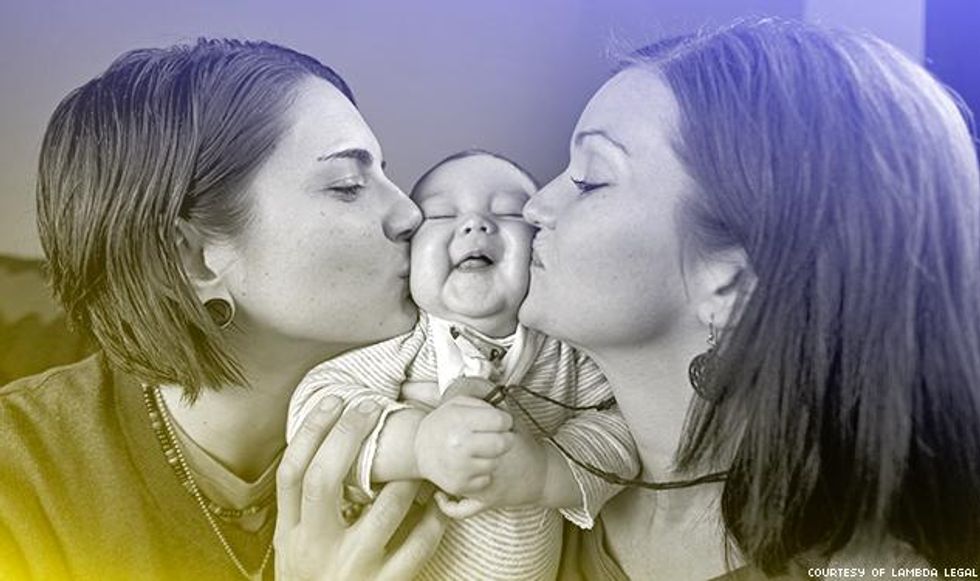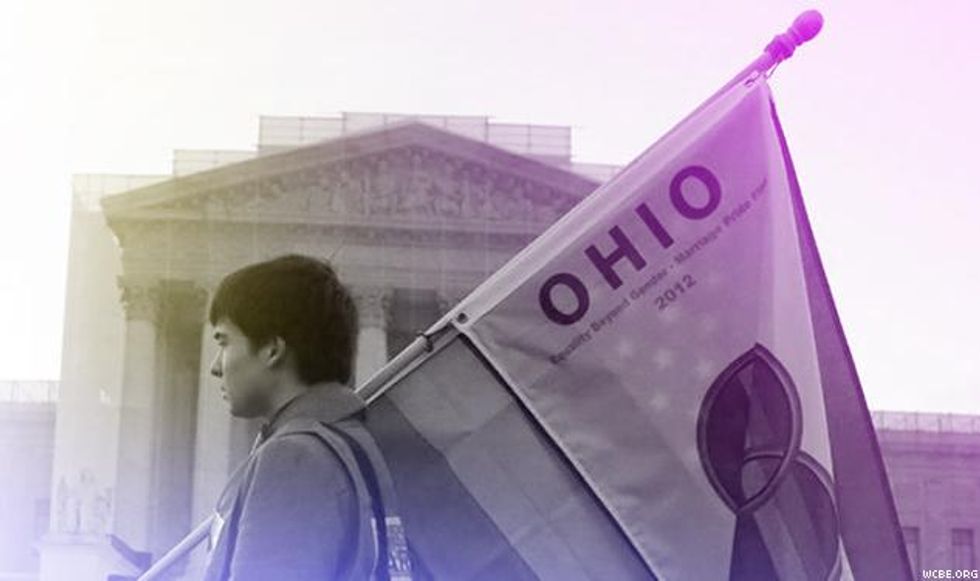
What's Going on in Ohio?
Same-sex couples can't yet marry in Ohio, but they might be able to do so this summer, depending on how the U.S. Supreme Court rules.
There are two cases currently pending in Ohio, both federal. One is Obergefell v. Hodges and concerns a couple facing a terminal illness. Together for more than 20 years, Scott Obergefell (above, left) and his late husband John Arthur (above, right) married in a specially equipped medical jet on the tarmac of Baltimore-Washington International Airport in July 2013, before Arthur succumbed to amyotrophic lateral sclerosis, or ALS. Later that same month, a judge ruled that the state must recognize the men's marriage on Arthur's death certificate. Ohio Attorney General Mike DeWine consistently appealed each pro-equality ruling throughout 2014, and in November a three-judge panel on the Sixth Circuit Court of Appeals upheld the state's ban on same-sex marriage. The plaintiffs appealed, and Obergefell is now one of the cases consolidated and awaiting oral argument at the U.S. Supreme Court.
The second case is Henry v. Hodges and concerns several same-sex couples who wish to list both parents on their children's birth certificates. The same judge who presided over the Obergefell case ruled in this case that the state's ban is unconstitutional but that his decision only affected the plaintiffs during the appeals process.

What Happens Next?
The U.S. Supreme Court will hear oral argument in the Ohio cases April 28, with a decision expected sometime in late June, at the end of the court's 2015 term. Notably, that schedule for a ruling is purely speculative, and the high court could issue its ruling at any point after oral arguments are heard, with no advance notice.
If the Supreme Court upholds marriage equality, there would likely be a brief period of confusion, during which antigay state officials struggle to comply with the ruling. Some states might try to delay the start of marriage as long as possible or create artificial roadblocks to obtaining a marriage license. That's been the case in conservative states court-ordered to embrace marriage equality, with lawmakers proposing legislative workarounds to same-sex marriage in Oklahoma, North Carolina, and most recently, Alabama.
It's hard to say what would happen if the Supreme Court rules against marriage equality. It's possible, though unlikely, that states which currently have marriage equality might try to undo it. What's most likely is that such a ruling would maintain the status quo of the country's patchwork of marriage laws. In other words, states that already have marriage equality would likely maintain it, while states that have resisted would not be compelled to embrace same-sex marriage. In that case, the only recourse would be a slow, expensive state-by-state effort to repeal the bans. That would need to be prefaced by a lengthy public education campaign that would likely take years.

How Do Ohioans Feel About Marriage?
Polling on marriage in Ohio is fairly limited, but data indicates that the state lags behind the rest of the country in terms of acceptance for same-sex unions. Over the last three years, five surveys have shown that support for marriage equality is generally hovering in the low 50-percent range, with opposition generally trailing close behind.
Ohio's ban on same-sex marriage dates back to February 2004, when legislators overwhelmingly passed a statutory ban. That December, voters approved a constitutional amendment prohibiting same-sex marriage -- or any legal relationship recognition for same-sex couples -- by 64 percent, according to the Columbus Dispatch.
Several organizations in Ohio have considered a ballot measure to overturn the constitutional amendment, but so far signature-gathering has proved too expensive.

What Are the Arguments for Marriage Equality?
The arguments in Ohio are similar to those made in most other marriage equality cases: that marriage equality is required by the Due Process and Equal Protection clauses of the U.S. Constitution. The Ohio plaintiffs specifically claim that the 2013 Windsor case, which overturned a key section of the Defense of Marriage Act, establishes precedent that the state's ban is impermissable.
In addition, the plaintiffs claim that the marriage ban discriminates based on sexual orientation and gender. "No presumption of constitutionality should apply to sexual orientation discrimination," they write, adding that the basis is also subject to heightened scrutiny since in discriminates based on gender.

What Are the Arguments Against Marriage Equality?Ohio's arguments are generally consistent with those of other states: that the will of the voters is more important than the U.S. Constitution.
That argument was echoed by the Sixth Circuit Court, which in November became the only federal appellate court since the
Windsor decision to
uphold a state's ban on same-sex marriage in a consolidated case challenging marriage bans in Tennessee, Michigan, Kentucky, and Ohio. In that ruling, the court wrote that it should defer to voter preferences as expressed at the ballot.
The state also has made the usual arguments that have failed in other cases: that Ohio should be allowed to "wait and see" how marriage proceeds in other states, and that the state only wishes to uphold tradition. These have not proved to be compelling arguments -- a constitutional amendment is definitive and does not lend itself to "wait and see," and tradition alone cannot be the sole basis for upholding a law, the Supreme Court has previously determined.























































































Viral post saying Republicans 'have two daddies now' has MAGA hot and bothered